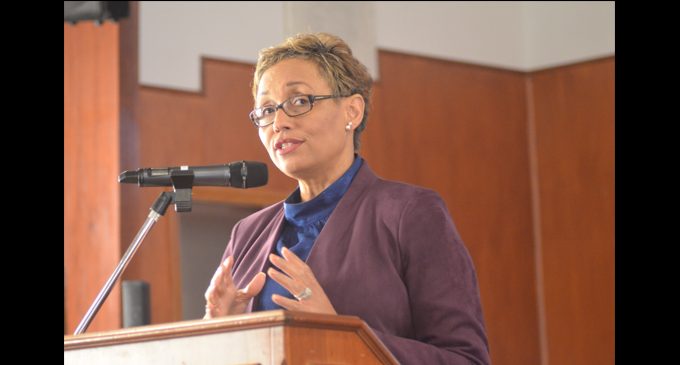Superintendent calls on community to help turn things around in local schools
Dr. Angela Pringle Hairston makes a presentation to the Minsters’ Conference of Winston-Salem and Vicinity earlier this week.

Over the past three months Angela Pringle Hairston, the superintendent of Winston-Salem/Forsyth County Schools (WS/FCS), has been on a district-wide tour speaking with those in the community with vested interest in the school system and the future of our children. And earlier this week Hairston made a stop at Emmanuel Baptist Church to speak with members of the Ministers’ Conference of Winston-Salem and Vicinity (MCWSV).
Before joining WS/FCS earlier this year, Hairston worked more than 30 years in public education as a superintendent, principal, assistant principal and a math teacher. Her most recent stop before relocating to N.C. was in Augusta, Ga., where she served as superintendent for Richmond County Schools. Before that she served as a region superintendent for the Dekalb County School District in Georgia as well.
While giving Hairston’s introduction on Tuesday, Dec. 2, Pastor Tembila Covington, MCWSV president, said although they’ve waited some time to have the sit-down with the superintendent, it was well worth the wait.
“We waited a long time, but it’s never too late to learn more so we can help our children grow and become more successful,” Covington said. “I believe she will share more that she’s already doing to ensure there is equity being served in our school district.”
To begin her presentation, Pringle Hairston talked about how the education system has changed over the years and how No Child Left Behind (NCLB) and the Every Student Succeeds Act (ESSA) placed more emphasis on accountability.
She said in 2002 when President George W. Bush signed NCLB into law, we started to see the segregation of data by subgroups that led to more segregated and more failing schools. When discussing ESSA, which was signed into law by President Barack Obama in 2015, Hairston said although it too is an accountability measure, it gave more power to individual states and put more emphasis on equity.
“When we moved to ESSA, there was a lot of language around equity because 13 years later, what we realized was that this accountability move led to people being segregated, moving out of neighborhoods and separating themselves,” Hairson continued. “The first thing we have to do is understand what the accountability system looks like. And I don’t want to say that accountability has an agenda; it just has an impact that we have to understand.”
Hairston said when she joined the local school district, there were already several things in place that she will build on as superintendent, including addressing equity, creating a strategic plan, and school choice. During her presentation, Hairston also discussed third grade reading scores, high school graduation rates, the African American Infusion course, wrap-around services for students and parents, behavior, increasing access to pre-K, and several other topics.
Moving forward, Hairston said her main focus will be moving all students forward and to do that, it will take the collective efforts of the entire community. She said, “There are very old school, basic things that have to happen on our part and we have to own it. And then there are things that must happen in the community.
“The school system is going to do the work it has to do. We’re going to get it right; this board is serious and they have the potential. But at the same time, we as a school district cannot do it alone because the school does not live apart from the community.”









